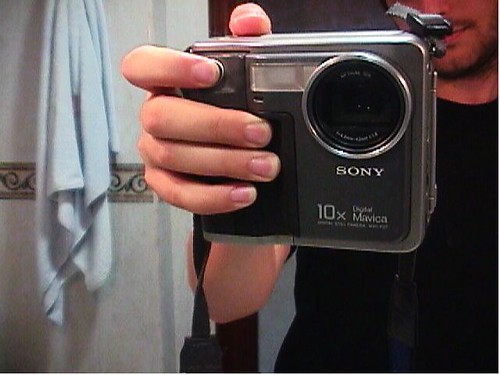Difference between revisions of "Sony Mavica FD7"
m (fixed broken photo) |
Hanskerensky (talk | contribs) (<!--Commented out image, no longer available on Flickr, please remove if not returned by 12/2017 -->) |
||
| Line 21: | Line 21: | ||
|image_rights= nc | |image_rights= nc | ||
}} | }} | ||
| − | {{Flickr_image | + | <!--Commented out image, no longer available on Flickr, please remove if not returned by 03/2018 {{Flickr_image |
|image_source= http://www.flickr.com/photos/backchat2000/6839762308/in/pool-camerawiki | |image_source= http://www.flickr.com/photos/backchat2000/6839762308/in/pool-camerawiki | ||
|image= http://farm8.staticflickr.com/7052/6839762308_42818e8061_m.jpg | |image= http://farm8.staticflickr.com/7052/6839762308_42818e8061_m.jpg | ||
| Line 28: | Line 28: | ||
|image_by= Pat Newman | |image_by= Pat Newman | ||
|image_rights= wp | |image_rights= wp | ||
| − | }} | + | }} --> |
Revision as of 05:21, 25 August 2017

|
| Mavica FD7 self-portrait image by pmarin (Image rights) |
The Mavica FD5 and the Mavica FD7 were introduced together by Sony in 1997. The more expensive FD7 offered an autofocus f/1.8–2.9 zoom lens, with 10x range having a 35mm equivalent of 40–400mm. These two were the first truly digital models in the Mavica series from Sony, as the earlier Mavicas were still-video cameras recording analog scan lines onto 2" Video Floppies. The FD designation referred to the use of 3.5" computer floppy disks for storage, which continued through to the 2002 Mavica FD100 and FD200.
The FD7 uses a sensor intended for television cameras, recording two interlaced fields. These images were downsampled to 640×480 pixel JPEGs and saved to floppy disks. In "standard" quality a floppy can hold up to 40 images; in "fine" mode, up to 20. Anticipating a feature that became ubiquitous in later digital cameras, "picture effects" including pastel, sepia, and B&W modes may be selected.
A proprietary NP-F530 lithium battery pack provides 7.2-volt power.

|
| image by Vagn Sloth-Madsen (Image rights) |